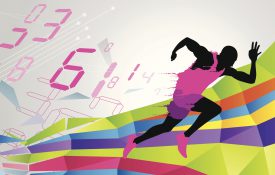-

Systematic Research Investigates Effects of Money on Thinking, Behavior
Three experiments provide inconsistent evidence for the effect of money primes on various measures of self-sufficient thinking and behavior.
-
Degrees of Maybe: How We Can All Make Better Predictions
NPR: Turn on the TV, and you'll find no shortage of people who claim to know what's going to happen: who's going to get picked for the NBA draft, who will win the next election, which stocks will go up or down. These pundits and prognosticators all have an air of certainty. And why shouldn't they? We, as the audience, like to hear the world's complexity distilled into simple, pithy accounts. It doesn't help that these commentators rarely pay a serious price when their predictions don't pan out. Read the whole story: NPR
-
Forgot Where You Parked? Good
The New York Times: School’s out for the summer — and so begins a long few months of parents’ and teachers’ worrying about all the things their children will forget before the fall. The fractions they won’t be able to multiply. The state capitals they won’t be able to identify. “Learning loss” is the name for it. Forgetting is supposed to be the antithesis of learning, and whether we’re a kid or an adult, most of us are plainly embarrassed if we can’t recall a name or fact. But it turns out that forgetting can help us gain expertise, and when we relearn something we couldn’t recall, we often develop a richer form of understanding. Read the whole story: The New York Times
-
WATCH: Ben Folds and a surgeon show what happens when music enters the brain
Stat: Earlier this month, Limb joined Ben Folds and the National Symphony Orchestra in an off-the-cuff demonstration of musical creativity and how it comes about in Ben Folds’s brain. STAT then sat down with Folds and Daniel Levitin, a neuroscientist and musician, to talk about how Folds thinks about the music that he makes. Read the whole story: Stat
-

Meaningless Accelerating Scores Yield Better Performance
From typing to exercising, racking up meaningless digital points can serve as an effective motivator, as long as the scores are accelerating.
-
Microaggressions?
Aeon: Across college campuses and the corporate landscape, a big idea has taken hold: the notion that microaggressions – subtle but offensive comments or actions directed at minorities or other powerless people – can lower performance, lead to ostracism, increase anxiety, and sometimes cause so much psychological pain that the recipient might even commit suicide. Yet despite the good intentions and passionate embrace of this idea, there is scant real-world evidence that microaggression is a legitimate psychological concept, that it represents unconscious (or implicit) prejudice, that intervention for it works, or even that alleged victims are seriously damaged by these under-the-radar acts.

